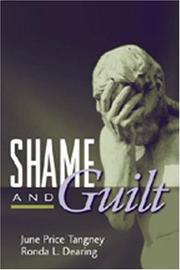| Listing 1 - 2 of 2 |
Sort by
|

ISBN: 1572307153 9781572307155 1572309873 9781572309876 Year: 2002 Publisher: New York (N.Y.): Guilford
Abstract | Keywords | Export | Availability | Bookmark
 Loading...
Loading...Choose an application
- Reference Manager
- EndNote
- RefWorks (Direct export to RefWorks)
"Shame and guilt, while the focus of attention among scholars and clinicians for generations, have only recently been subjected to systematic empirical scrutiny. This volume reports on the growing body of knowledge about these key self-conscious emotions, integrating findings from the authors' original research program with other data emerging from social, clinical, personality, and developmental psychology. June Price Tangney and Ronda L. Dearing offer a new scientific perspective on shame and guilt. Evidence is presented to demonstrate that these universally experienced affective phenomena have significant - and surprisingly disparate - implications for many aspects of human functioning, with particular relevance for interpersonal relationships." "This book is for researchers, students, and practitioners across a wide range of psychological disciplines. It will serve as an informative text in advanced undergraduate and graduate-level courses."--Jacket.
Shame --- Guilt --- Honte --- Culpabilité --- Emotions --- Culpabilité --- Ethics --- Conscience --- Psychological aspects --- Culpabilité. --- Guilt. --- Honte. --- Schaamte. --- Scham. --- Schuldgefühl. --- Schuldgevoel. --- Shame.
Book
ISBN: 1433809680 Year: 2011 Publisher: Washington, District of Columbia : American Psychological Association,
Abstract | Keywords | Export | Availability | Bookmark
 Loading...
Loading...Choose an application
- Reference Manager
- EndNote
- RefWorks (Direct export to RefWorks)
"Shame is a common emotion that contributes to many problems that bring clients into therapy, such as poor psychological adjustment, interpersonal difficulties, and overall poor life functioning (see Tangney & Dearing, 2002). Not only is shame a factor underlying many of the reasons that clients seek psychotherapeutic help, but clients may feel shame as a result of needing help with their emotional concerns. Once in therapy, clients may further experience shame while discussing intimate details about themselves. Shame is therefore likely to be elicited frequently in therapy, though signals of client shame may be subtle. If a therapist fails to recognize client shame, the client's shame-related problems will likely continue. Furthermore, clients who experience unacknowledged shame in the context of therapy may feel misunderstood, resulting in an empathic failure on the part of the therapist. Such empathic failure may result in premature termination of therapy. Therefore, therapists must recognize, acknowledge, and address client experiences of shame--to both build a therapeutic alliance and resolve the shame. The intent of this book is to provide clinicians with guidance for dealing with client shame. All aspects of shame are covered, including how shame develops, how it relates to psychological difficulties, how to recognize shame and how to help clients resolve shame-related problems. The chapters bring together wisdom and insight gained from years of clinical experience, shared by master clinicians who have struggled to manage and positively transform shame in the therapy hour. In particular, the chapter authors provide specific strategies that they use to help their clients resolve shame-related issues, and they illustrate these techniques using detailed examples and clinical dialogue. We are delighted with the resulting volume of chapters by gifted authors who provide outstanding insights into the clinical presentation, management, and resolution of shame in the therapy hour. The intended audience for this book includes clinical and counseling psychologists, psychiatrists, social workers, marital and family therapists, addictions counselors, and other mental health providers. The book should be of interest to clinicians in training as well as seasoned professionals, the majority of whom are unlikely to have had any specific training in shame-related issues but who almost certainly encounter clients' shame experiences on a daily basis. We expect that readers will benefit from the material on different levels; new therapists are most likely to benefit from the notion of being attuned to client shame as an important aspect of therapy, whereas experienced therapists are more likely to see the book as a much-needed set of tools for addressing the longstanding challenge of helping clients work through shame in a way that will prevent future negative consequences"--Introduction. (PsycINFO Database Record (c) 2011 APA, all rights reserved).
Psychotherapist and patient. --- Shame. --- Shame --- Psychotherapy --- methods
| Listing 1 - 2 of 2 |
Sort by
|

 Search
Search Feedback
Feedback About
About Help
Help News
News